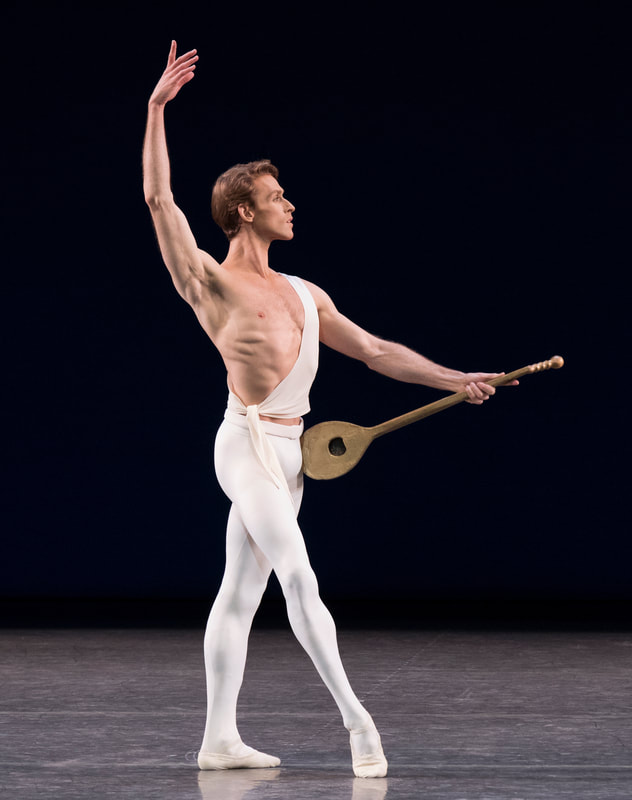|
Adrian Danchig-Waring as Apollo The New York City Ballet Gala at Saratoga Performing Arts Center is often more about being seen than seeing ballet. It’s a complaint I’ve been making for years and while it has gotten better (I no longer see drunks throwing up in trash bins) the audience still can act more like they’re at a ball game than a ballet.
That said, City Ballet’s program at Saturday’s big fundraiser was enough to pause some of the restless audience giggling and chatter. The respectable and eye-catching program started out with one of George Balanchine’s masterpieces – “Apollo.” This Stravinsky-inspired ballet, Balanchine’s first with the composer most closely associated with him, is always a delight to see because it exposes the artistic maturation of the company’s highest-ranking male dancers. On Saturday, it was the striking figure of Adrian Danchig-Waring. The ballet is a coming of age story for Apollo, the young god, who frolics and is nourished by three muses – Sterling Hyltin as Terpsichore, Brittany Pollack as Polyhymnia and Indiana Woodward as Calliope. (Of course he prefers the goddess of dance, Terpsichore.) Yet the women’s roles are secondary to the title role, which Danchig-Waring performed with a vigor that was tinged with a boyish naivete, so befitting for Apollo. He’s flexing his muscles, quite literally, with a trio of adoring females who also care for him – holding his head when he tires as well as feeding his ego as they cling to him on his journey to the heavens. The ballet is essential for all those who love metaphorical imagery because the work moves from one compelling pose to another. It opens with Apollo swinging his arm to crudely play a long-necked lute. The muses approach him reverently, kicking their long legs upon entering his realm and, when reaching him, forming a crown on his head with their hands. They fall under his spell, allowing him to pose, divide and unite them. They are his team of horses, they are his playmates and in the end his starburst in the sky. Danchig-Waring was equal parts sweet and strong, but not yet a standout. As he performs it more, he will surely grow more compelling in the role. The evening proceeded with a surprise – Ashley Bouder and Joseph Gordon performed the celebratory final pas de deux from “Coppelia” to make up for the ballet's cancelation on Saturday afternoon due to the excessive heat. Bouder, as always, was purity as the young bride. I am always amazed by her zest and her exquisiteness. Bouder is a supreme pleasure. Christopher Wheeldon’s sobering “This Bitter Earth,” another pas de deux, was also excellent. While I can never erase the original ballerina, Wendy Whelan, from my mind’s eye as she was the part, Sara Mearns was distinctive. Dancing with the sensitive Tyler Angle, Whelan’s original partner, Mearns had a juicy quality that exuded a thoughtful elegance that was just right for the somber work. The evening ended with Justin Peck’s “Principia” to a commissioned score by Sufjan Stevens. As always, Peck came up with some memorable moments – the beginning and ending most notably. But the music did not allow for one central theme to emerge, which meant that the choreography lost its momentum in several spots. Unfortunately, it is not Peck’s best. More unfortunate, “Principia” was the final image that City Ballet fans were left with as the short five-day stay is sadly over.
2 Comments
7/21/2019 07:57:47 pm
What a wonderful insight. Educational and entertaining writing about dance. It's more than just beautiful people prancing about on stage.
Reply
Leave a Reply. |
Wendy
|

 RSS Feed
RSS Feed
